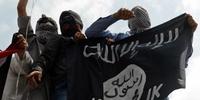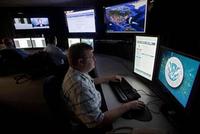-
U.S. intelligence, leaders unclear on exact danger posed by ISIS

Considerable discrepancies in the reporting from U.S. intelligence services regarding the strength of the Islamic State (IS) have led critics to the conclusion that the U.S. intelligence community knows little about the terrorists’ actual strength as the United States is in the process of developing a military strategy to defeat the Islamist organization.
-
-
Sensors everywhere might mean privacy nowhere: Expert
Just as we are coming to grips with having less privacy in our lives thanks to the Internet, a new use of the technology is poised to present new questions about security and privacy — and create a new threat to society. The so-called “Internet of Things” will see small microprocessors and sensors placed seemingly everywhere, and these devices will collect much data about us — often without our knowledge. A second concern with the Internet of Everything is that we may have already crossed a threshold where a large event that would cripple these devices would mean that our current civilization would come to an immediate stop. An occurrence of a massive solar flare, like the 1859 Carrington Event, could disable all the devices on which we have come to depend. “If something like that were to happen, the Amish would become the only people without a major life upheaval,” says one researcher.
-
-
Atlanta’s rapid transit deploys AI video analytics to bolster public safety
The Metropolitan Atlanta Rapid Transit Authority (MARTA) is deploying Behavioral Recognition Systems’ AISight, an artificial intelligence-based analytics solution that teaches itself to recognize and alert on unexpected patterns within massive volumes of data.
-
-
People in leadership positions more willing to sacrifice privacy for security
People with higher job status may be more willing to compromise privacy for security reasons and also be more determined to carry out those decisions, according to researchers. This preoccupation with security may shape policy and decision-making in areas ranging from terrorism to investing, and perhaps cloud other options, said the author of the new study, adding: “What may get lost in the decision-making process is that one can enhance security without the negative impact on privacy.”
-
-
NSA, FBI monitored e-mails of prominent Muslim American leaders, attorneys
The NSA and FBI monitored the e-mails of prominent Muslim American leaders and attorneys, including the head of the largest American Muslim civil rights group, The Intercept reported yesterday. Critics of the surveillance programs of the NSA and other government agencies said the revelations proved their contention that these programs should be more closely monitored. The critics say that in order to obtain FISA court approval for the surveillance, the government alleged that these activists were agents of foreign powers. The critics also note that the monitoring of lawyers’ e-mails raises concerns that some of the information collected may be protected by the attorney-client privilege, which the intelligence agencies are bound to respect.
-
-
Supreme Court cites NIST guidelines in ruling on cell phone searches
As digital technology transforms twenty-first century life, questions about privacy rights abound. The U.S. Supreme Court ruled on one such question in late June: if you are arrested, can the police search your cell phone without first obtaining a warrant? No, according to the 25 June 2014 ruling in Riley v. California. “Modern cell phones are not just another technological convenience. With all they contain and all they may reveal, they hold for many Americans ‘the privacies of life,’ … The fact that technology now allows an individual to carry such information in his hand does not make the information any less worthy of the protection for which the Founders fought,” Chief Justice John Roberts wrote for the majority.
-
-
License plate readers still to reach their full potential
Systems which automatically read automobile license plates have the potential to save police investigative time and increase safety, but law enforcement officials must address issues related to staffing, compatibility and privacy before the technology can reach its full potential, according to a new study. Addressing these issues will require a clear understanding of the current and potential value of the systems to criminal justice agencies.
-
-
NSA shelved collection program which could have prevented 9/11 attacks: Critics
Fourteen years ago the NSA research unit developed a collection program called Thin Thread which, its authors say, could have detected the perpetrators of the 9/11 attacks and prevented it. Critics of the program agreed it was a good program, but that it picked up more Americans than the other systemsthen being considered, and was thus deemed too invasive of Americans’ privacy. In the fall of 2000 General Michael Hayden, then-director of the NSA, decided against the program largely because of the legal implications.
-
-
Leaked documents reveal law enforcement hacking methods

Through the sourcing of a leaked documents cache from the Italian firm Hacking Team, members of the University of Toronto’s Citizen Lab have revealed the methods of law-enforcement hackers. While much of Snowden’s revelations concerned broad international surveillance, documents from Hacking Team reveal more specific methods such as the actual techniques for tapping phones and computers to operate as eavesdropping devices.
-
-
Privacy advocates worried about new Senate cybersecurity bill
Privacy groups are concerned that a new Senate cybersecurity bill could give the NSA unrestricted access to personal information of Americans. The Cybersecurity Information Sharing Act (CISA), a counterpart to the Cyber Intelligence Sharing and Protection Act (CISPA) which passed the House in 2013, would create a “gaping loophole in existing privacy law,” several privacy advocacy groups wrote in a letter to lawmakers.
-
-
U.S. needs better intelligence cooperation with African states for effective counterterrorism strategy
The U.S. focus on counterterrorism efforts in Africa will require forming long-term partnerships with nations, an all-hands-on-deck commitment from all U.S. military branches, and a strong investment in intelligence, and surveillance technologies to face significant challenges created by the continent’s size and scope. Forming intelligence partnerships with Africa’s fifty-four countries, all with their own civil and military traditions, mixed with multiple languages and cultures is complex.
-
-
Supreme Court: police must obtain a warrant to search suspect’s cellphone
Earlier this week the Supreme Courtruled that law enforcement must obtain a warrant to search a suspect’s cellphone. Law enforcement argued that no current law makes a distinction between cellphones and the pocket litter (wallets, cigarette packs) which police have always been permitted to search when arresting a suspect, but Chief Justice John Roberts rejected this argument, saying, “That is like saying a ride on horseback is materially indistinguishable from a flight to the moon,” adding: . “Modern cell phones, as a category, implicate privacy concerns far beyond those implicated by the search of a cigarette pack, a wallet or a purse.” Roberts acknowledged that requiring police to seek a warrant could impede some investigations but “privacy comes at a cost,” he said.
-
-
Judge rules use of NSA surveillance-based information in terrorist case is legal
Lawyers for Mohamed Mohamud, a U.S. citizen who lived in Oregon, have been denied a motion to dismiss his terrorism conviction, with the court affirming the legality of the U.S. government’s bulk phone and e-mail data collection of foreign nationals living overseas. Mohamud’s defense team claimed the surveillance violated his constitutional rights, and that federal prosecutors did not make available to the defense evidence obtained via the surveillance. U.S. District Judge Garr King upheld Mohamud’s conviction, saying that suppressing the evidence collected through NSA surveillance “and a new trial would put defendant in the same position he would have been in if the government notified him of the (surveillance) at the start of the case.”
-
-
Defense in terror case challenges exclusion from court session on surveillance records
The defense for Adel Daoud, a young Muslim man who was arrested outside a Chicago bar in an undercover FBI operation and charged with attempting to blow up the bar, has submitted a motion objecting to a private court session held to discuss the defense’s access to classified records. “Not only do I not get to be there, but I didn’t even get to object,” defense attorney Thomas Durkin said. “I had to object over the fact that I couldn’t even make an objection.”
-
-
NSA, other agencies, collect millions of images for large facial recognition databases
The NSA, through its global surveillance operations, has been accumulating millions of images from communication interceptions for use in high-level facial recognition programs, according to classified 2011 documents leaked by Edward Snowden. The documents do not reveal how many people have been targeted with facial recognition programs, but given the NSA’s foreign intelligence mission, a bulk of the imagery collected would involve foreign nationals.
-
- All
- Regional
- Water
- Biometrics
- Borders/Immig
- Business
- Cybersecurity
- Detection
- Disasters
- Government
- Infrastructure
- International
- Public health
- Public Safety
- Communication interoperabillity
- Emergency services
- Emergency medical services
- Fire
- First response
- IEDs
- Law Enforcement
- Law Enforcement Technology
- Military technology
- Nonlethal weapons
- Nuclear weapons
- Personal protection equipment
- Police
- Notification /alert systems
- Situational awareness
- Weapons systems
- Sci-Tech
- Sector Reports
- Surveillance
- Transportation
Advertising & Marketing: advertise@newswirepubs.com
Editorial: editor@newswirepubs.com
General: info@newswirepubs.com
2010-2011 © News Wire Publications, LLC News Wire Publications, LLC
220 Old Country Road | Suite 200 | Mineola | New York | 11501
Permissions and Policies
Editorial: editor@newswirepubs.com
General: info@newswirepubs.com
2010-2011 © News Wire Publications, LLC News Wire Publications, LLC
220 Old Country Road | Suite 200 | Mineola | New York | 11501
Permissions and Policies
